Hunting season: The escalating tech recruitment war
Huge billboards, parties, massive bonuses, viral videos, and vacations. The battle for tech talent has reached “madness” levels but is it all necessary or are there egos at play?
The majority of Israelis, those who do not work in high-tech, have been quite confused for some weeks now. Over recent days, the Ayalon Highway, which runs through the heart of the country’s center, has been flooded with Amdocs billboards. Before that, it was gaming company Overwolf, cybersecurity giant Palo Alto, Playtika, Rapyd, Similarweb, and even venture-capital fund Group 11.
The use of billboards and campaigns by tech companies is not completely new, in recent years a handful of companies, sporadically, used this strategy. But now these giant ads, which cost millions of shekels, are everywhere, and with the stated goal of recruiting. Those who are not in tech may wonder who exactly chooses to work for a particular company because of a billboard, but those in the know have a clear understanding of the situation - we are at the height of the hunting season, and the pursuit after every employee takes place on every possible front, even on the side of the road, with the end justifying every possible means.
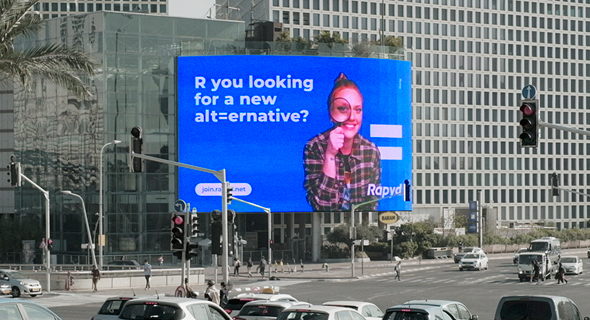
Rapyd’s recent move, for example, consisted of a complex combination. At first, about six months ago, came the billboards, hung up and taken down repeatedly. A couple of months ago, they were put up again, but this time they counted down to a festive event, which cost NIS 10 million (more than $3 million) - a "recruiting party," no less. The fintech company posted a technological riddle online, and those who solved it received tickets to the massive party, with internationally known DJs, and an invitation to a job interview.
According to the company, this multi-layered campaign, which included a day-long special broadcast on 102FM Tel Aviv Radio, produced 900 resumes, to help fill 300 job openings. Ultimately 400 candidates attended the party earlier this month, (along with about 1,000 of the company’s employees), and a few dozen of them are already in the process of joining.
Other companies are also throwing “recruitment parties,” and events such as barbecues for candidates once a week, or incentivizing their employees to help and find new candidates, even dedicating working hours to it, and especially offering very generous bonuses reaching tens of thousands of shekels for successful recruitments.
This behavior by the industry is a direct result of the recent boom in the high-tech sector, which is leading to massive growth and a constant need for new staff. "It is insane what is going on right now with recruitment," says Shahar Sorek, CMO at Overwolf. Many resources - time, effort, and money - are currently devoted to finding new employees. Some of the tools are more effective, for example, the “bring your friend” method, while the effectiveness of others is more controversial. The industry also admits that the billboards are there because of a broader image war, that is about more than just recruiting employees. There is some scent of desperation, and it is all happening very rapidly because everyone knows that in a moment it may all be over.
$12,500 per friend
Madness and its synonyms often come up again and again in conversations with high-tech people about the current situation. A frenzy of big money flowing into more and more companies, more and more unicorns. An insane shortage of workers as huge R&D centers are launching, companies are expanding, and everyone is looking for workers for a variety of positions, but finding none. Companies are “stealing” employees or trying to woo candidates who are debating between several options, and since the industry is flooded with capital, there is a great deal of money invested in the matter, and the options are limitless, with the madness evident in the scope of recruitment means.
The upper mentioned “bring your friend” method, for example, is a common reward method that existed in high-tech for years, however, the bonuses have never been so high. Some are still relatively small, the e-commerce company Roundforest, which is currently recruiting about 70 employees, promised on social media an iPhone 13 for those who help it recruit a product VP, and pays NIS 8,000 ($2,500) to employees who bring new hires. At Simplify the incentive is between $2,000 to $10,000, sometimes plus a new iPhone, and sometimes the reward is converted to a vacation abroad at a similar value.
Amdocs pays between $5,000 to $10,000 upon the hiring of a new recruit but also rewards with gift cards the very transfer of a resume or when a candidate comes for an interview. “Bring your friend” method generates about 40% of our recruitments, and when we focus our efforts and raise the rewards, it increases to more than 50%," said Eti Raihenshtein, Amdocs’ recruitment director in Israel.
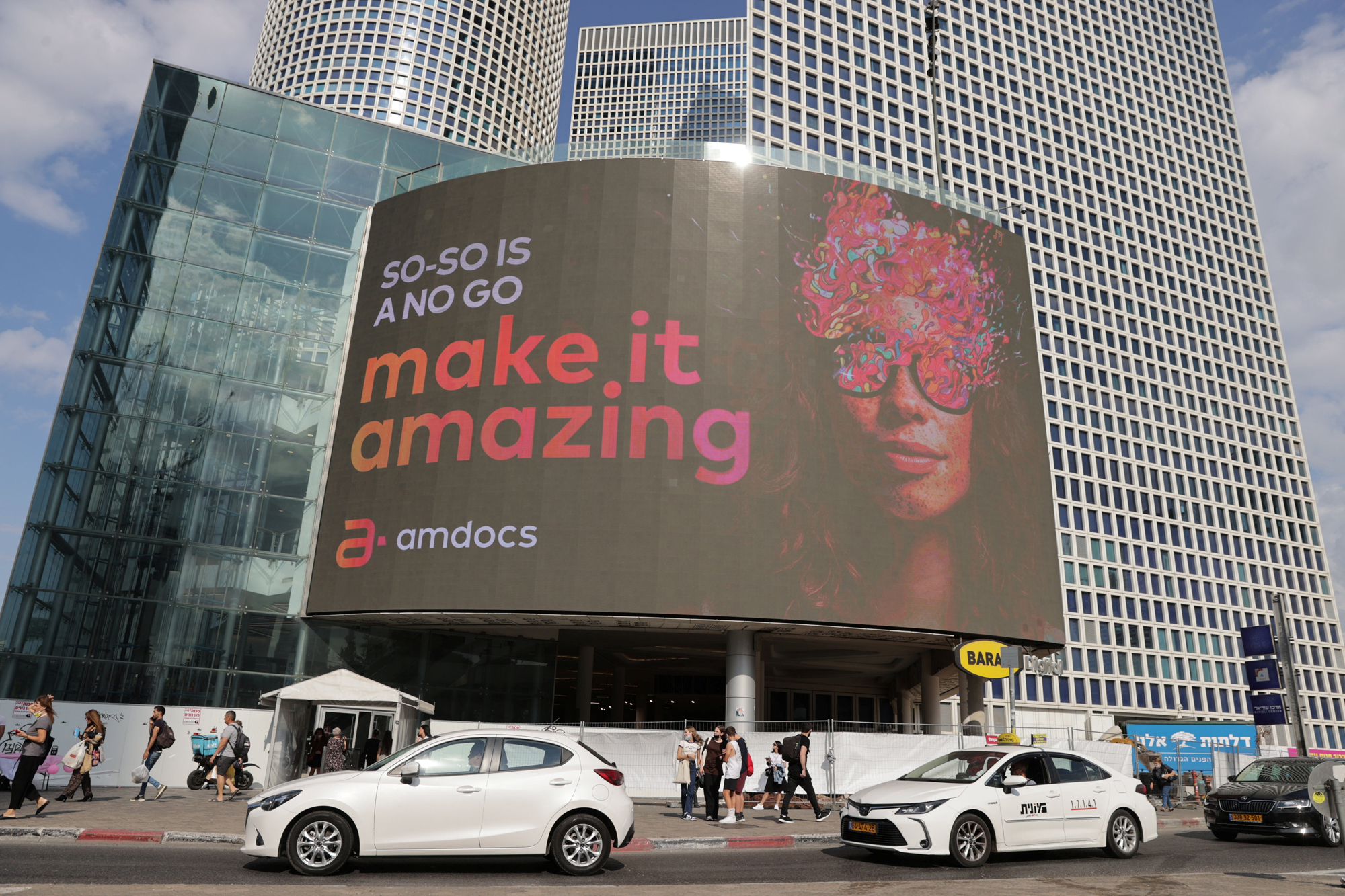
Fintech company Plus500 used to give vacations in Mexico or Thailand, however, with the Covid-19 pandemic shutting down global flights, it first converted the reward to NIS 20,000 (more than $6,000), and since, went as far as NIS 40,000-50,000 ($12,500-$15,500). Nir Tsabar, a senior software engineer, joined Plus500 more than a year ago from Intel and brought in two more employees. He was rewarded with NIS 40,000 ($12,500) for it. "There is massive encouragement to bring in friends, and the return is very generous," he said. "Even when convincing employees, they make offers that can not be refused, they insist and do everything to attract you. During Covid, for example, they sent our parents gift packages with personal messages, my mother cried with excitement." Reaching employees through parents, by the way, is not unique to Plus500. Papaya Global has used employees’ parents for a television campaign, and some billboards targeted candidates' family members.
While reaching family could help, and the bonuses are tempting, sometimes hunting for employees requires even more. Hence the new trend of "LinkedIn parties", which is gaining momentum in companies such as CyberZen, OwnBackup, Weka.IO, Cellopark, and others.
Employees go hunting
500plus is publicly traded in London and employs about 200 people locally and another 300 in subsidiaries around the world. If you walked into its Haifa conference room this past Tuesday at 9:30am, you would find a table with a glorious breakfast, surrounded by software engineers and their computers, all on LinkedIn, and hovering around them is the company's HR staff. Music is playing in the background, and a list of dozens of open positions at the company is displayed on a big screen. The engineers, who are supposed to engage in R&D, are immersed for two hours in recruitment. "It is completely hunting," admits Eden Dahan, the company's human resources manager in Israel.
During LinkedIn parties, employees locate potential candidates among their acquaintances on the social network and reach out to them in person. "It brings people with the same DNA as our employees, we had three parties so far and recruited seven people, and there are ten employees who received bonuses of NIS 20,000 (more than $6,000) each," Dahan said. After the initial conversation, the HR staff goes to work. "We are not giving up on anyone here. We even convinced someone who had already signed with Microsoft, myself and one of the VPs worked on it, and if necessary the CEO will also meet a candidate who is on the fence. I have no choice, we are growing exponentially, but candidates have so many options, they want lavish salaries and an easier life, for example wanting to avoid our screening day, even if it can be done from home. In the end, I will not lose them to Amazon or Microsoft over money.”
Chen Matzkin Brand, Technology talent sourcer at cloud computing company OwnBackup, which is valued at $3.3 billion, also throws LinkedIn parties and pays between $2,000 to $4,000 to an employee who brings in a friend. "Since the beginning of the year, we recruited 48 employees, four through LinkedIn parties and six through ‘bring your friend,’” she noted.
Meaning the majority are eventually recruited not through company employees but other methods?
“True, however, recruiting through your employees is efficient. We did, for example, a Mexican-style LinkedIn party, hats, tacos, music, a whole atmosphere, and for an hour and a half the employees were focused on sending personal messages to the people they wanted to work with. We get resumes like this, and employees earn points that accumulate for meals at expensive restaurants or even for vacations, and they constantly ask about candidates they brought in, what happened with them, where they are in the process."
They want the reward.
"Yes, but they also want to work with their friends.”
Grilling and recruiting
Cyber company Orca Security is valued at $1.8 billion, it employs 200 people in Israel and is now looking for another 30 at least, and every Sunday at 12:30pm., it hosts a big barbecue on the roof of its office in south Tel Aviv. Meats, beer, and potential employees are all on the menu. "People know what it is like to work in an unpleasant place. There is an advantage in working with people you love and who you would like to have a beer with," said Gil Gron, one of the company founders. "There are good offers in many places, and reward is no longer the main factor. You spend a lot of hours at work, and there is concern about how it will be, how will you get along with people, it is a fear that can not be resolved in a job interview. So we found a way to let a candidate experience the family atmosphere in the company. I estimate that if the candidate already came to the barbeque, that increases the chances of them joining the company by 50%, and it has already led us to hire more than ten people."
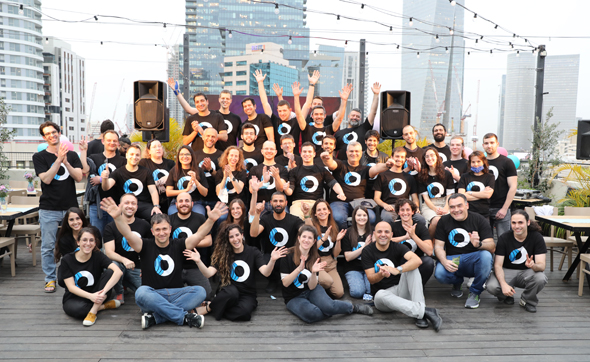
And how much do you pay for a "bring your friend" hire?
"I admit we took it a bit to the extreme. It is a cumulative mechanism, with flights to Europe for example, and if you already brought two employees you get two tickets to the Maldives. The best manpower comes this way, so we prefer it over other means, and incentivize our employees to work on it."
The shortage of employees will not go away any time soon, and now that you are increasing the rewards you know you will need to increase them even further later.
"And yet, it is not expensive compared to regular hiring processes. We do not hang ads along the Ayalon highway, we invest directly in what we want to achieve. Personal appeal is important in recruiting programmers. For example, the situation is so crazy that people just open LinkedIn or Facebook to find a never ending stream of offers."
In such a situation, does a start-up like you have an advantage or a disadvantage over the huge competitors?
"Start-ups are more flexible, have fewer admissions processes, and even among the candidates, there are those who are looking for the dynamism of a young company. So I think it is easier for start-ups at the moment."
700% increase in the number of resumes
The matter of start-up companies versus the tech giants is a major issue, one that drives both the employment battle and the war over a company’s image, which takes place on the side of the road, and on social media.
"In the past year, a lot of money has gone into high-tech and huge companies are setting up R&D centers. Only Microsoft, for example, plans to recruit 2,500 employees in the coming years," said Sorek, who is the man behind the Overwolf’s signs that popped up in recent weeks. “How can you be a startup when everyone is competing with you over developers? That is one of the reasons we ran this campaign."
But how do billboards help you in a battle for developers?
"The goal is to generate a discussion, the main thing is that we are being talked about. We want to reach out to the high-tech people, but also their surrondings, their family members, mom and dad. There is no doubt that this is a show of force, a statement saying 'we are here,' but it is also effective at an immediate level. We saw a 700% increase in the number of resumes we received because of this campaign.”
Overwolf has been around since 2011 and has about 100 workers, but along the highway, it is up against Amdocs, a 40-year-old giant that is traded on the NASDAQ at a value of more than $10 billion and employs 5,000 people in Israel and another 25,000 worldwide. And Amdocs also targets the candidates’ parents.
"Billboards have a wide effect, your dad or your girlfriend sees the sign and talks about it at dinner," said Gil Rosen, Amdocs' CMO. “It is a conversation that is hard to create online. Even if the employee himself can be targeted by digital means, billboards and television are what affect the consciousness in Israel. Everyone drives on Ayalon, and I want to reach audiences that affect the employees, not just the employees themselves."
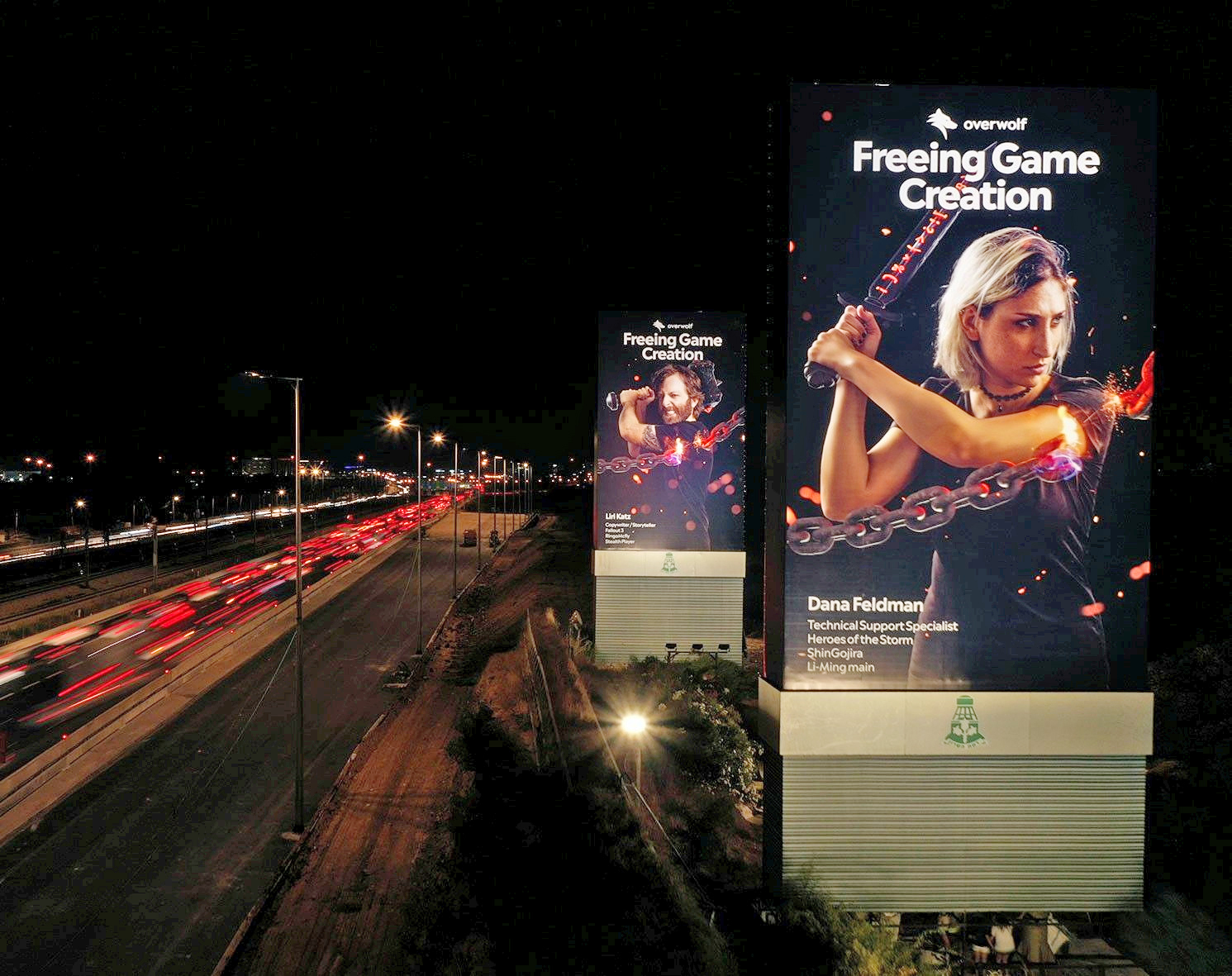
And yet, the parents of the candidates know that Amdocs exists, unlike most other high-tech companies. You are a familiar veteran, you do not have to introduce yourself like younger companies. Why do you go for this show of force, covering Ayalon with colorful billboards?
“Overwolf said ‘look at me, I am here,' that is our challenge too around the world, but in Israel, the challenge is to change the perception of Amdocs as an old company. The issues we deal with are at the forefront of technology. We need to change the public perception, so we rebranded, we wanted to say 'Good morning, we are not a company of yesteryear'. And since we have hundreds of vacancies, this lays the ground for a situation where our recruiter calls."
So while other companies want to announce their existence, are you trying to reintroduce yourself?
"It is hard work not to be perceived as a dinosaur because we are an advanced and cool company. The idea is not to spoon-feed a candidate and say 'join us,’ but to make it clear that we are not the same billing company from the 1990s, and that we offer room to grow. We have already seen an increase by thousands of percent in clicks on our site.”
The Amdocs campaign, by the way, is much more than billboards. It also included a day-long radio broadcast from the company’s campus in Ra’anana, and a song by international sensation Noga Erez, written especially around the company’s new theme "Make it Amazing." The song’s video also gave Amdocs a presence on social media, the final arena of the battle for new employees.
No billboards, yes Maldives
More than a few industry leaders we spoke with expressed reservations about the billboards. "I preferred to take the employees on vacation in the Maldives, it seemed to me a better investment than billboards," said Eynat Guez, CEO and founder of the fintech company Papaya Global. The employees were filmed on holiday, and appeared on the company’s viral video, the point of which was, quite explicitly - ‘we do not invest in billboards, we invest in our workforce’.
So no billboards, but you did run a campaign on television and social media, featuring company employees and their parents.
"Yes, because you have to grab the attention. Corporations make an effort to look cool, and everyone has to flex some muscle at a time when there is a lot of money in the industry and all companies need to grow fast in all areas. You have to stand out somehow."
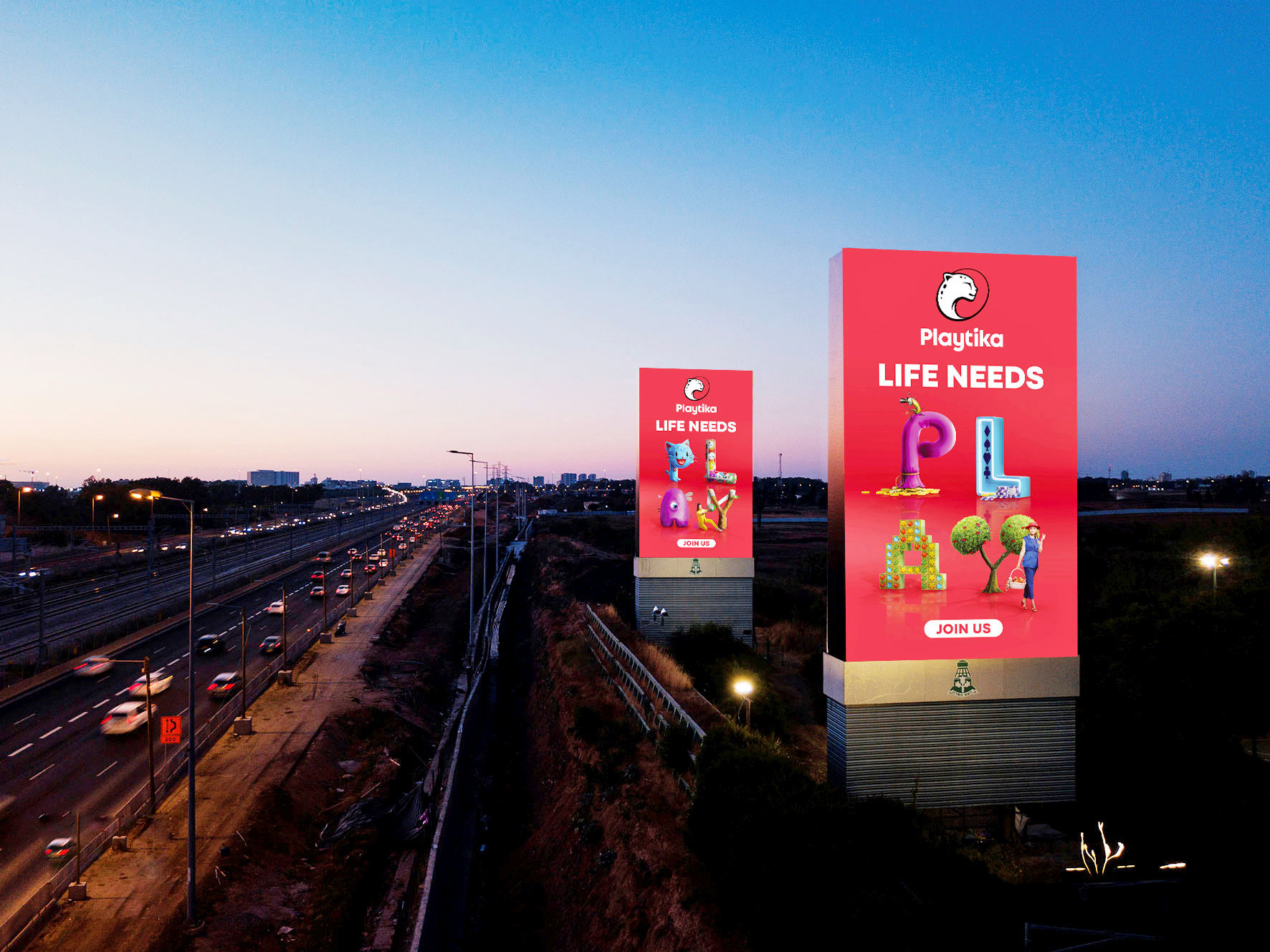
Online viral videos by high-tech companies have become as popular in recent months as billboards, if not more. Blue White Robotics recruited comedian and actor Guri Alfi (also the brother of managing founder Ben Alfi), GotFriends brought in local actress Alona Saar, Microsoft hired the judges from Israel’s Master Chef, and videos from Salesforce, Artlist, and others caught the eyes of many. The most prominent video was probably that of digital advertising company AppsFlyer, which ridiculed the industry’s hunt itself, capturing an attentive audience who is probably a little tired of the whole thing. "We had no idea it was going to be so viral, it was crazy," admitted Oren Kaniel, the company's CEO and co-founder. “It made people smile and introduced a few catchphrases."
While your video mocks the recruitment frenzy, you have no choice but to be a part of it as well. Do you think it is excessive?
"It depends. If you exaggerate with the ‘bring your friend’ method', for example, you will get less diversity, and if the bonuses are too high, employees may focus on that instead of working. We did not have billboards. When I see something extravagant I do not feel comfortable with it. We are still in the middle of the coronavirus pandemic, some populations have been hit hard during this crisis as the rich get richer and the gaps grow. So there is a show-off and extravagance here. Furthermore, every wave like this comes to an end eventually, and it could happen tomorrow, in a week, or a year."
Nir Zuk, one of Israel's high-tech veterans and the founder of Palo Alto, shares the same sentiment. “There were times when the money In high-tech made no sense, in the late 1990s, and then you saw companies giving a Porsche as a signing bonus. People do not remember it now," he said. "Recruiters made a lot of money back then too, they were given 100% of the annual salary of the employee they recruited, when the normal amount should be 10%. So now it is repeating itself, and there is the Maldives and more social media, and I understand the reasons for every campaign I see. I know why they came out with every ad, but I'm not excited about it. In this aspect, the world goes crazy regularly, and the companies that remain sane are the ones that will manage to survive the fall. Those who spend money now will not survive the crisis, so companies need to act today as they would in times of crisis, as if it is already here.”



